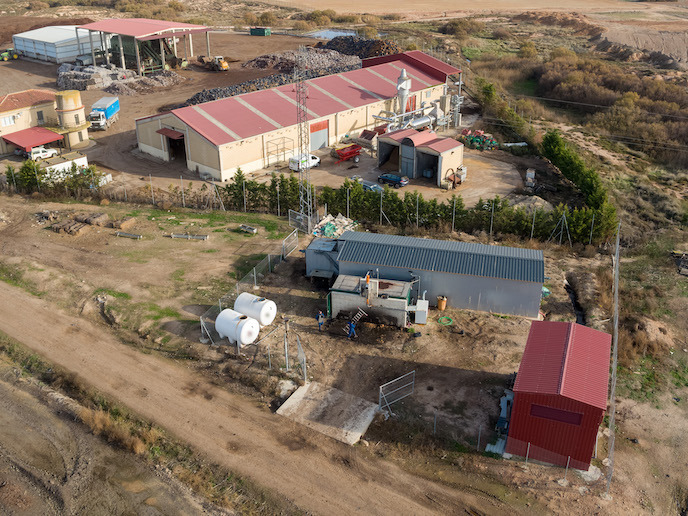A growing opportunity: turning mushroom substrate into fertiliser
Just as plants get their growth nutrients from soils, mushrooms get them from substrates comprised of livestock and agricultural waste. After cultivation, with nutrients depleted these are known as spent mushroom substrates (SMSs). SMS is commonly recomposted for fertiliser, but with a high moisture content (around 70 %) it first has to be dried to reduce transportation costs. This traditionally involves leaving the substrate outside, relying on the sun. The EU-supported project www.smartmushroom.eu (Smartmushroom) has developed and demonstrated a process which uses biogas generated from fresh SMS to dry a mix of digestate and SMS for conversion into pelletised fertiliser. “This organic fertiliser can be sold to any region in Europe,” says project coordinator Pablo Martínez from the Mushroom Technological Research Centre of La Rioja. “As farmer demand for pellets is higher than the manufacturing capacity of our pilot plant, we are happy with the project results.”
Producing organic fertiliser
Smartmushroom’s new methanogenic technique uses hydrolysis followed by anaerobic digestion. The resultant biogas powers a drying process with up to 28 % humidity which, by using condensation and adsorption through sepiolite filters, accelerates water removal from the SMS. The dried SMS can then be enriched with natural nitrogen, phosphorus and potassium fertiliser, tailored to specific agricultural needs, before being pelletised. The project carried out several trials focused on three areas. To test anaerobic digestion, the team experimented with different digestion mixtures at lab scale. With SMS as the main raw material, other agri-waste substrates were added to optimise biogas generation and increase methane content. This enabled the team to set the optimum feed parameters for a pilot plant. The best ratio proved to be seven parts SMS to two parts waste water from marmalade manufacturing, and one part glycerine. The dryer’s temperature, timing and belt speed were adjusted to maximise its biogas-driven performance, while accommodating composition variations. This enabled an automatic setting to be established for the dryer. The SMS-based pellets were tested as fertiliser for several crops – including lettuce, cauliflower, pepper, tomato, broccoli, vineyard and cereal. This was done in greenhouse and open fields in Serbia and Spain. “These trials were so successful that the farmers participating wanted to continue using the pellets,” notes Martínez. The project built an SMS-ADryer pilot plant at Sustratos de La Rioja, the authorised mushroom waste manager in the region. The anaerobic digesters are installed in a modular container version, as opposed to a concrete building, to accommodate varying SMS quantities. The dryer is composed of a burner which dries the SMS to the humidity required by the production line making the pellets. “The results have been very positive, with the pilot plant able to convert 36 000 tonnes of fresh SMS into 8 500 tonnes of organic fertiliser pellets annually,” adds Martínez.
Mushrooming benefits
Smartmushroom’s innovation will not only save growers waste management costs, calculated at EUR 29.2 million for the whole European sector according to Martínez, but actually create a source of revenue. The system also offers environmental benefits, as the process is carbon sequestrating, transferring atmospheric carbon dioxide into the soil. It also helps mitigate soil degradation by adding fertiliser with up to 50 % organic matter. “Increasing the value of mushroom waste, Smartmushroom can increase growers’ profits, benefiting employment and a more competitive agri-sector,” remarks Martínez. With industrialisation simulations already available, the pilot plant is ready to be scaled up. COVID-19 travel restrictions allowing, the team will soon organise visits to the plant.
Keywords
Smartmushroom, mushroom, substrate, waste, fertiliser, organic, pellet, crop, biogas, agricultural, carbon dioxide

